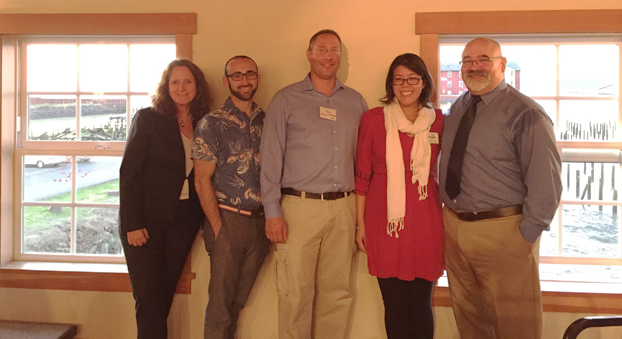Contacts:
Katherine Bunting-Howarth, New York Sea Grant Associate Director, E: keb264@cornell.edu, P: 607-255-2832
Kara Lynn Dunn, NYSG Great Lakes Freelance Publicist, E: karalynn@gisco.net, P: 315-465-7578
Ithaca, NY, October 25, 2017 – David B. MacNeill was awarded the 2017 William Q. Wick Visionary Career Leadership Award presented by the National Sea Grant Extension Assembly at its biennial meeting in Oregon earlier this month. MacNeill served 28 years as the Great Lakes Fisheries and Ecosystem Health Specialist with New York Sea Grant (NYSG) Extension, based at the State University of New York (SUNY) Oswego.
The Wick award is the highest honor given to Sea Grant Extension personnel by their peers. MacNeill was selected for the honor from among the 571 Sea Grant Extension professionals serving across the United States.
Research, extension and outreach work by MacNeill, who retired in August 2017, has advanced the communication to and understanding of Great Lakes science by diverse audiences.
"The work Dave MacNeill championed has proved to be visionary, practical, and trusted not only in the Great Lakes region but internationally," said New York Sea Grant Associate Director Katherine Bunting-Howarth.

Wick Award recipient and former (retired) New York Sea Grant Great Lakes Fisheries Specialist Dave MacNeill (at far right) is pictured with (l-r) NYSG Associate Director Kathy Bunting-Howarth, NYSG Seafood Specialist Michael Ciaramella, NYSG Great Lakes Fisheries Specialist Jesse Lepak and NYSG Jamaica Bay Coastal Resilience Specialist Helen Cheng. Credit: Helen Cheng/NYSG
Highlights of the impact of the work by MacNeill include research and outreach into fish trawl methods that led to changes in how personnel on each of the Great Lakes scientifically sample fish and has improved stakeholder understanding of the data collected by trawling. His trawl design outreach information was utilized by the University of Southern Bohemia in the Czech Republic to build a new trawling vessel and gear now being used to sample on inland lakes in the European Union.
A report written by MacNeill in 2005 after assembling a panel of world-renown fisheries experts on Lake Ontario fish stocking issues is a constant reference for resource managers in New York State and, in the past three years, has helped improve Lake Ontario forage fish trawling efforts, which now take into account sampling in Canadian waters as recommended by that report.
Anglers and fisheries managers are more alert to the next generation of aquatic invasive species to watch for across the Great Lakes Basin thanks to programming developed by MacNeill.
In 2010, MacNeill and Dr. Paul Bowser of Cornell University received the first Sea Grant Association Research to Application award from the National Sea Grant Office for their research and outreach, particularly to commercial aquaculture business owners, on viral hemorrhagic septicemia, a deadly infectious fish disease.
MacNeill championed opportunities to enhance how educators communicate about the uncertainties associated with the natural environment. His programming on climate change science was the first training for all land grant and Sea Grant extension educators at Cornell University and was requested as a training for National Weather Service employees.
The Dogs and HABs publication written by MacNeill in 2014 on how pet owners can protect their dogs from toxins associated with HABs, harmful algal blooms, remains in high demand and was stocked at selected New York State Parks this past summer. Ducks Unlimited magazine shared this educational message nationwide.
MacNeill received the Great Lakes Sea Grant Network Outstanding Program Award in 1990, 1992 and 1998; the Sea Grant Advisory Service Award of Excellence in 1993; the Northeast Extension Directors Award of Excellence in 1995; and the Great Lakes Sea Grant network Superior Outreach Award in 2012.
More Info: New York Sea Grant
New York Sea Grant (NYSG), a cooperative program of Cornell University
and the State University of New York (SUNY), is one of 33 university-based
programs under the National Oceanic and Atmospheric Administration’s
National Sea Grant College Program.
Since 1971, NYSG has represented a statewide network of integrated
research, education and extension services promoting coastal community
economic vitality, environmental sustainability and citizen awareness
and understanding about the State’s marine and Great Lakes resources.
Through NYSG’s efforts, the combined talents of university scientists
and extension specialists help develop and transfer science-based
information to many coastal user groups—businesses and industries,
federal, state and local government decision-makers and agency managers,
educators, the media and the interested public.
The program maintains Great Lakes offices at Cornell University, SUNY
Buffalo, SUNY Oswego and the Wayne County Cooperative Extension office
in Newark. In the State's marine waters, NYSG has offices at Stony Brook
University in Long Island, Brooklyn College and Cornell Cooperative
Extension in NYC and Kingston in the Hudson Valley.
For updates on Sea Grant activities: www.nyseagrant.org has RSS, Facebook, Twitter, and YouTube links. NYSG produces a monthly e-newsletter, "NOAA Sea Grant's Social Media Review," via its blog, www.nyseagrant.org/blog. Our program also offers a free e-list sign up via www.nyseagrant.org/coastlines for its flagship publication, NY Coastlines/Currents, which is published quarterly.